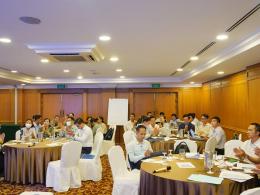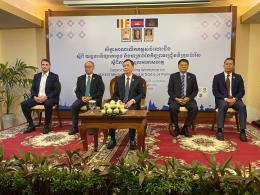The National Council for Sustainable Development (NCSD) and the Ministry of Environment (MoE) organized a press conference, a panel discussion, and an official launch of the report: “Cambodia’s Long-Term Strategy for Carbon Neutrality (LTS4CN)” on 11th of February, 2022, at the Ministry of Environment. The event was presided over by H.E. Mr. Say Samal, Chair of the NCSD and Minister of Environment. At the launching event, H.E. Mr. Say Samal, Chair of the NCSD and MoE, highlighted that the implementation of the LTS4CN provides three foremost benefits:
1. Cambodia is consistently delivering on its commitments under the UNFCCC. In 2020, Cambodia was one of 72 countries to submit an updated NDC in time. On December 30, 2021, Cambodia delivered on her commitment made by our Samdech Akka Moha Sena Padei Techo Hun Sen, Prime Minister of the Kingdom of Cambodia, at the UN Climate Ambition Summit by submitting the LTS4CN before the end of 2021. Cambodia is only the second Least Developed Countries (LDC) in the world, and the first country in ASEAN, to submit a strategy with a 2050 target for net-zero emissions.
2. The launch of the LTS4CN is a proud moment for Cambodia because the document brings together long-term commitments from across key sectors. The LTS4CN is broadly consistent with the targets of the Updated NDC for 2030. Moreover, it also incorporates more ambitious targets for the future towards economic growth, improvement of sustainable livelihood, sustainable forest management, biodiversity conservation and disaster management.
3. The launch of the LTS4CN comes at very crucial time for Cambodia’s development journey, and for regional and global partnerships on climate change, green economy, and particularly the recovery from the Covid-19 pandemic. He highlighted that all stakeholders must put their partnerships to the next level to deliver on target commitments in the LTS4CN.
He also mentioned that there is a need to increase private and public investments, but also technology transfer, and support to develop the skills needed. At the end, H.E. Mr. Say Samal thanked the panelists who actively participated in the panel discussion organized and relevant ministries/institutions, development partners and stakeholders who have contributed to the development of this important document, including the United Nations Development Programme, the United Kingdom, Food and Agriculture Organization of the United Nations, the World Bank, Agence Française de Développement, the European Union, Sweden, and the Global Green Growth Institute.





